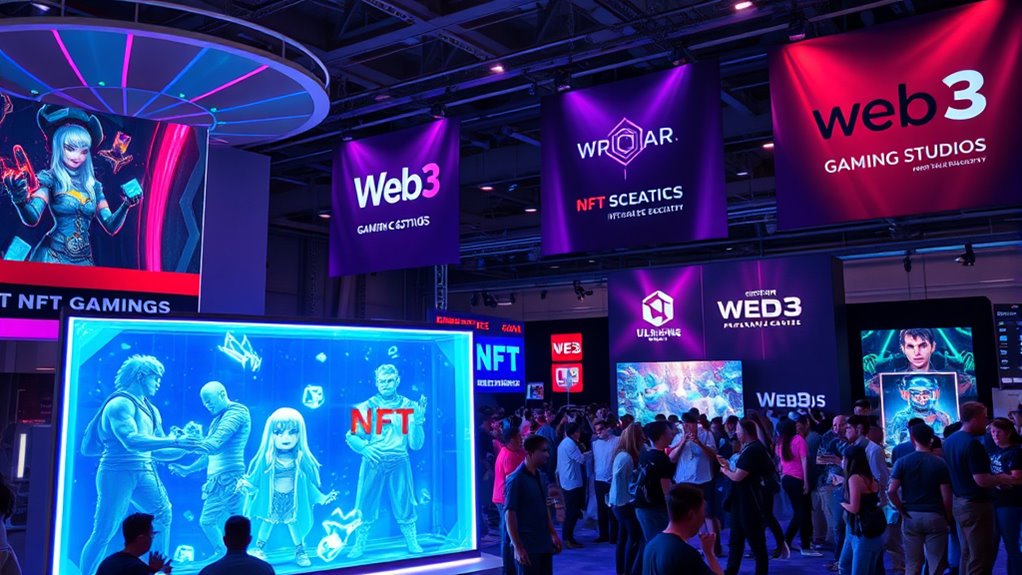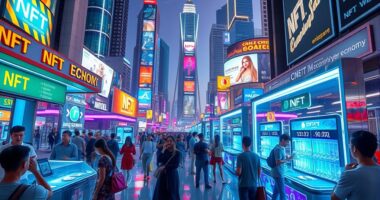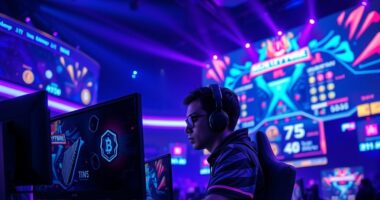Major gaming studios are now embracing Web3, integrating NFTs into traditional games to give players true ownership of in-game assets like skins, weapons, and collectibles. This shift allows you to trade, sell, and invest in digital assets on open marketplaces, transforming game economies and boosting player engagement. Blockchain technology guarantees assets are secure, scarce, and authentic. As industry leaders explore these innovations, you’ll discover more about how gaming is evolving into a dynamic, player-centric experience.
Key Takeaways
- Major gaming studios are integrating NFTs to enable true ownership of in-game assets like skins and weapons.
- Blockchain technology provides transparency and security, preventing fraud and verifying asset authenticity.
- NFT adoption fosters new player-driven economies and enhances community engagement through trading and collaboration.
- Companies are experimenting with play-to-earn models, translating effort into tradable digital assets.
- The industry is shifting towards more transparent, player-centric experiences, redefining traditional gameplay with Web3 features.

As major gaming studios increasingly adopt Web3 technology, they’re transforming how players interact with games and digital assets. One of the most significant shifts is the rise of NFT integration and blockchain gaming, which introduce a new level of ownership and value to in-game items. Instead of virtual assets being confined to a game’s servers, you now have the ability to truly own your digital belongings, trade them freely, or sell them on open marketplaces. This shift empowers you to participate in a broader economy around your favorite games, blurring the lines between gaming and digital asset investment.
NFT integration plays an essential role in this evolution. Non-fungible tokens (NFTs) serve as unique digital certificates that verify ownership of individual items—be it rare skins, weapons, characters, or collectibles. When a major studio incorporates NFTs into their games, you can acquire items that are verifiably scarce and genuinely yours, stored securely on the blockchain. This enhances the value of your virtual possessions and opens up new possibilities for customization and personalization. Instead of simply earning or *accessing* items within a game, you can now buy, sell, or trade NFTs across different platforms, creating a more dynamic and player-driven economy.
NFTs verify ownership of unique in-game items, enabling secure trading and personalized digital assets across platforms.
Blockchain gaming is at the core of this transformation, offering a transparent and decentralized environment where your assets are protected and verifiable. With blockchain technology, every transaction related to your in-game assets is recorded immutably, ensuring authenticity and reducing fraud. As you engage with these games, it becomes clear that your ownership isn’t just a game mechanic but a verified asset on the blockchain. This shift also means that developers can introduce play-to-earn models, where your time and effort translate into tangible, tradable assets, giving you a more rewarding experience. Additionally, understanding the nutritional value of chia seeds highlights how data about intrinsic value and benefits can be applied to digital assets, emphasizing the importance of verified ownership and quality.
Major studios are experimenting with integrating NFTs and blockchain gaming to redefine traditional gameplay experiences. Instead of static, non-transferable items, you get real ownership and control over your digital assets. This fosters a deeper sense of investment and connection to the game world. Furthermore, it creates opportunities for community-driven economies, where players can collaborate, trade, and build value together. As these innovations become more mainstream, you’ll likely see a broader acceptance of blockchain-based assets, changing how you perceive in-game purchases and collectibles altogether.
In essence, the embrace of Web3 by major gaming studios is reshaping the gaming landscape, making it more open, transparent, and player-centric. NFT integration and blockchain gaming are not just buzzwords—they’re the foundation of a new era where your digital assets hold real-world value, and your gaming experience becomes more dynamic and personalized.
Frequently Asked Questions
How Do NFTS Affect Game Balance and Fairness?
NFTs can impact game balance and fairness by creating disparities between players, which might hurt your trust in the game. Market volatility of NFTs means their value can fluctuate rapidly, leading to unfair advantages or losses. If you rely on NFTs for in-game assets, you could face unpredictable scenarios that disrupt fair play. Staying cautious helps maintain your trust in the game’s integrity, despite the risks NFTs may introduce.
What Are the Environmental Impacts of Blockchain Integration?
Did you know blockchain networks can consume up to 1,800 kWh per transaction, comparable to a household’s monthly energy use? This high energy consumption markedly increases the carbon footprint of blockchain integration, raising environmental concerns. By understanding the energy demands and exploring greener alternatives like proof-of-stake, you can help reduce the environmental impacts associated with blockchain technology in gaming.
How Will NFTS Influence Player Ownership Rights?
NFTs will considerably enhance your player autonomy by giving you true ownership of in-game assets. With digital scarcity, you can trade, sell, or keep items across different games or platforms, making your investments more meaningful. This shift empowers you to control your digital assets rather than relying solely on game developers. As a result, your rights as a player expand, creating a more personalized and secure gaming experience.
Are There Risks of Increased Monetization Pressure?
Sure, the push for more monetization risks means you might find yourself exploited more than ever. It’s ironic how increased monetization pressure often aims to benefit players but can actually lead to player exploitation, pushing you to spend more and enjoy less. Studios may prioritize profits over your gaming experience, turning gameplay into a constant revenue stream. Be cautious—what seems like more choices could secretly be more traps.
How Do Studios Address Potential Legal Challenges?
You should stay proactive by consulting legal experts to address potential licensing disputes and jurisdictional issues. Studios often implement clear licensing agreements and adhere to local regulations to minimize legal risks. They also monitor evolving laws around NFTs and Web3, ensuring compliance across different regions. By establishing solid legal frameworks and engaging with regulators early, you can better navigate complex legal challenges and protect your projects from costly disputes.
Conclusion
As you step into this new gaming frontier, think of Web3 as a vast, uncharted ocean filled with treasures waiting to be discovered. Major studios are now sailing these waters, integrating NFTs to transform your gaming experience into a more immersive, personalized journey. Just as explorers carve paths through uncharted seas, you’re on the cusp of a revolution where your digital assets become part of a larger adventure. The future of gaming is yours to navigate—are you ready to set sail?








